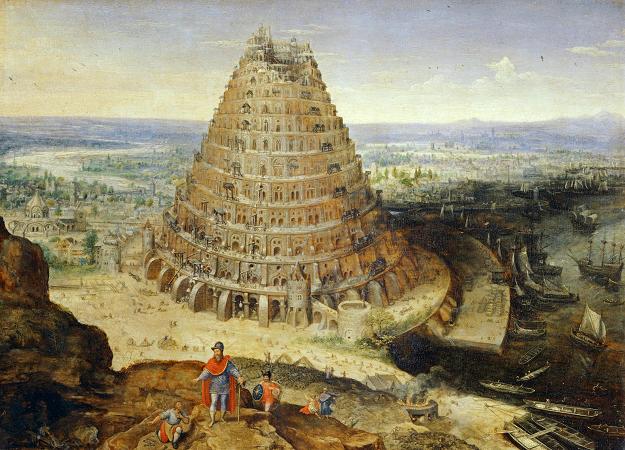Tower of Babel. The Tower of Babel narrative in Genesis 11:1-9 is an origin myth meant to explain why the world's peoples speak different languages. According to the story, a united humanity in the generations following the Great Flood, speaking a single language and migrating westward, comes to the land of Shinar. There they agree to build a city and a tower tall enough to reach heaven. God, observing their city and tower, confounds their speech so that they can no longer understand each other, and scatters them around the world. Some modern scholars have associated the Tower of Babel with known structures, notably the Etemenanki, a ziggurat dedicated to the Mesopotamian god Marduk in Babylon. A Sumerian story with some similar elements is told in Enmerkar and the Lord of Aratta. 1 And the whole earth was of one language, and of one speech. 2 And it came to pass, as they journeyed from the east, that they found a plain in the land of Shinar; and they dwelt there. 3 And they said one to another, Go to, let us make brick, and burn them throughly. And they had brick for stone, and slime had they for morter. 4 And they said, Go to, let us build us a city and a tower, whose top may reach unto heaven; and let us make us a name, lest we be scattered abroad upon the face of the whole earth. 5 And the L came down to see the city and the tower, which the children of men builded. 6 And the L said, Behold, the people is one, and they have all one language; and this they begin to do: and now nothing will be restrained from them, which they have imagined to do. 7 Go to, let us go down, and there confound their language, that they may not understand one another's speech. 8 So the L scattered them abroad from thence upon the face of all the earth: and they left off to build the city. 9 Therefore is the name of it called Babel; because the L did there confound the language of all the earth: and from thence did the L scatter them abroad upon the face of all the earth., Genesis 11:1-9 The phrase Tower of Babel does not appear in the Bible; it is always the city and the tower or just the city. The original derivation of the name Babel is uncertain. However, that form and interpretation itself are now usually thought to be the result of an Akkadian folk etymology applied to an earlier form of the name, Babilla, of unknown meaning and probably non-Semitic origin. The narrative of the tower of Babel is an etiology or explanation of a phenomenon. Etiologies are narratives that explain the origin of a custom, ritual, geographical feature, name, or other phenomenon. The story of the Tower of Babel explains the origins of the multiplicity of languages. God was concerned that humans had blasphemed by building the tower to avoid a second flood so God brought into existence multiple languages. Thus, humans were divided into linguistic groups, unable to understand one another. The story's theme of competition between God and humans appears elsewhere in Genesis, in the story of Adam and Eve in the Garden of Eden. The 1st-century Jewish interpretation found in Flavius Josephus explains the construction of the tower as a hubristic act of defiance against God ordered by the arrogant tyrant Nimrod. There have, however, been some contemporary challenges to this classical interpretation, with emphasis placed on the explicit motive of cultural and linguistic homogeneity mentioned in the narrative. This reading of the text sees God's actions not as a punishment for pride, but as an etiology of cultural differences, presenting Babel as the cradle of civilization. Tradition attributes the whole of the Pentateuch to Moses; however, in the late 19th century, the documentary hypothesis was proposed by Julius Wellhausen. This hypothesis proposes four sources: J, E, P and D. Of these hypothetical sources, proponents suggest that this narrative comes from the J or Yahwist source. The etiological nature of the narrative is considered typical of J. In addition, the intentional word play regarding the city of Babel, and the noise of the people's babbling is found in the Hebrew words as easily as in English, and is considered typical of the Yahwist source.
more...








